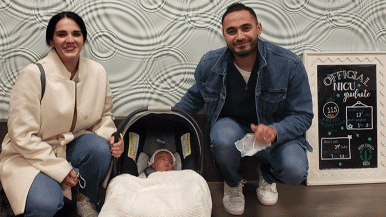Iris Touadi’s birthday was supposed to be Halloween. Instead, she was born on the Fourth of July — nearly four months early.
“It was very scary,” says Lynda Touadi, Iris’ mother. “We tried to be hopeful but it was very hard. We took some pictures just so we could remember her if she didn’t make it. We were scared to get too attached.”
A very premature birth
On July 2, Lynda experienced contractions and bleeding. When the contractions got worse, doctors admitted her to the hospital and started interventions, putting her on bed rest and giving her magnesium and steroids. Magnesium helps to suppress preterm labor, and steroids can help the unborn baby’s lungs develop more quickly.
But Iris wouldn’t wait. She was born two days later at 23 weeks and one day gestation – roughly just half the time a baby needs to develop and grow before birth. She weighed one pound. Her likelihood of survival was not high.
Iris spent nearly four months in RUSH Copley’s level 3 NICU, where nurses, physicians and other members of the care team provided advanced treatments and bedside vigilance to help her grow. Staff helped her breathe by intubation — inserting a tube into her windpipe — and mechanical ventilation (using a machine to move air in and out of the lungs,). They gave her feedings and medications through a tube. At 14 days, she got really sick — but then her breathing started to improve.
Hernan Sierra, MD, neonatologist and medical director of RUSH Copley’s level 3 NICU, attributes her survival to the discipline, focus and effort of her care team — along with a little luck.
“We were prepared,” he says. “The level of coordination and discipline in the nursing and physician staff was a significant factor in her survival. In terms of coordination and efficiency, the staff worked like a well-oiled machine. That is a big factor in helping extremely premature babies, especially one at the border of viability.”
Extremely low birth weight is considered to be less than 1,000 grams, he explains. Iris weighed just 468 grams.
Giving Iris her best chance
Neonatologist Chirag Talati, MD, a member of the team that cared for Iris, noted that survival rates are only about 50% to 60% for extremely premature babies, and many of those who survive have long-term problems. The doctors are pleased that Iris not only survived but is doing very well.
Sierra says seeing extremely premature babies like Iris survive and thrive is what makes RUSH Copley neonatologists love their jobs.
“Our interventions were key in helping, but a portion was out of our hands, whether you call that a miracle, God or luck,” Talati says. “We did what we needed to do to help her and give her the best chance.”
The obstetrics team contributed to Iris’ success story by administering magnesium and steroids while she was still in the womb, Sierra says. And her parents played a big role by being in the NICU for Iris every day.
“Physical contact is known to have a good effect on babies,” he says. “Skin-to-skin contact on mom or dad’s chest improves the baby’s vital signs and decreases their length of stay in the hospital.”
‘We prayed a lot’
Lynda believes her baby did so well “because of the doctors and nurses and because we believe so much in God,” she says. “We prayed a lot. I’m so thankful, very, very thankful.”
She and her husband, Tahar, also have a 2 ½-year-old daughter. They wanted to share Iris’ story to encourage other parents with premature babies. Before Iris’ birth, Lynda was going to school to become a nurse. Now she plans to be a nurse in the NICU. She thinks she could be helpful to other parents because of her personal experience.
“You think you did something wrong,” Lynda says but she learned that sometimes spontaneous labor just happens. Throughout Iris’ stay in the NICU, Lynda says the nurses and doctors made things much easier for them.
“We had some very hard days but they try to teach you everything,” she says. When the baby’s condition changed, they tried to explain what was going on.
After months in the ICU, Iris went home four days before what was to have been her birthday. Some premature babies go home on oxygen, but not Iris.
“She’s very feisty,” Lynda says. “She has been very feisty since Day One.”




